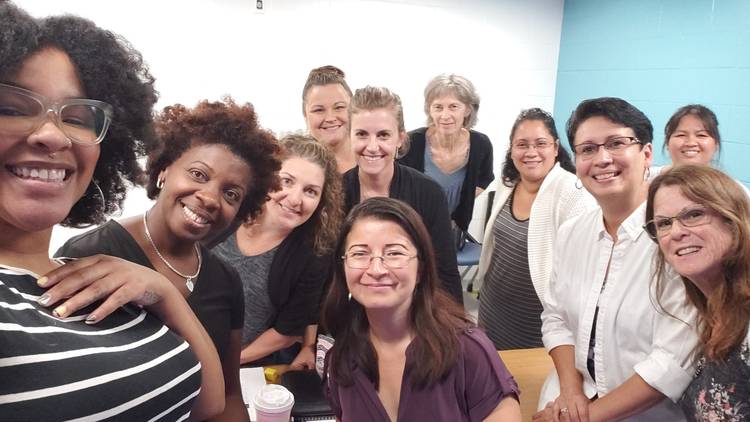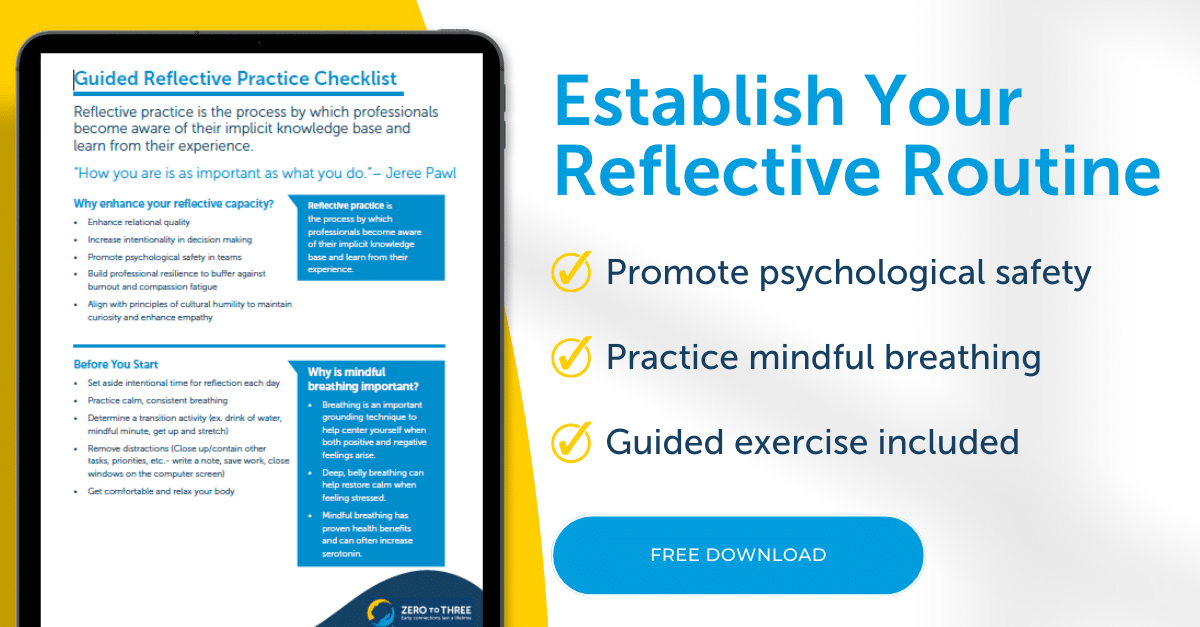1. Reflection
Reflection means stepping back from the immediate, intense experience of hands-on work and taking the time to wonder what the experience really means.
What does it tell us about the family? About ourselves? Through reflective practice, we can examine our thoughts and feelings about the experience and identify the interventions that best meet the family’s goals for self-sufficiency, growth, and development.
Reflection in a supervisory relationship requires a foundation of honesty and trust. The goal is to create an environment in which people do their best thinking—one characterized by safety, calmness, and support. Generally, supervisees meet with supervisors on a regular basis, providing material (like notes from visits with families, videos, verbal reports, etc.) that will help stimulate a dialogue about the work. As a team, supervisor and supervisee explore the range of emotions (positive and negative) related to the families and issues the supervisee is managing. As a team, they work to understand and identify appropriate next steps.
Supervisors can also support staff’s professional development by using supervisory meetings as an opportunity to scaffold, or support the acquisition of, new knowledge. One way of doing this is to encourage supervisees to analyze their own work and its implications. Reflection is important because it empowers staff to assess their own performance.
Awareness of one’s strengths, as well as one’s limits and vulnerabilities, allows individuals to make mid-course corrections in work performance that feel natural, unforced, and generated from within.
Reflective supervision is not therapy. It is focused on experiences, thoughts, and feelings directly connected with the work. Reflective supervision is characterized by active listening and thoughtful questioning by both parties. The role of the supervisor is to help the supervisee to answer her own questions and to provide the support and knowledge necessary to guide decision-making. In addition, the supervisor provides an empathetic, nonjudgmental ear to the supervisee. Working through complex emotions in a “safe place” allows the supervisee to manage the stress she experiences on the job. It also allows the staff person to experience the very sort of relationship that she is expected to provide for infants, toddlers, and families.
2. Collaboration
The concept of collaboration (or teamwork) emphasizes sharing the responsibility and control of power.
Power in an infant/family program is derived from many sources, among them position in the organization, ability to lead and inspire, sphere of influence, and network of colleagues. But most of all, power is derived from knowledge—about children and families, the field, and oneself in the work. While sharing power is the goal of collaboration, it does not exempt supervisors from setting limits or exercising authority. These responsibilities remain firmly within the supervisor’s domain. Collaboration does, however, allow for a dialogue to occur on issues affecting the staff person and the program.
Collaboration allows staff to express interest in taking on new tasks and challenges, as well as to exercise some control over the terms and conditions of their work. It offers supervisors and mentors a chance to learn from, as well as teach, staff.
Collaboration also allows supervisors to recognize opportunities to share responsibility and decision-making and, in so doing, cultivate leadership talent from within.
Collaborative supervisory relationships are characterized by a clear understanding of the reciprocal expectations of each partner. This “contract” is jointly developed and agreed upon by the supervisor and supervisee, and will vary in frequency, intensity, and focus across the organization. Key issues that should always be addressed, however, include logistical issues, such as when and where supervisory meetings will take place, and what will be discussed.
Finally, true collaboration requires open communication, flowing freely in both directions, and protected from “outsiders.” Both partners assume the best about each other. The supervisory relationship is one characterized by a feeling of trust and safety, where difficult issues can be discussed without fear of judgment, disclosure, or ridicule. Open communication implies curiosity and active listening. Either partner can ask “What were you thinking when you did that?” as a means of learning more about the motivations and thoughts of the other.
3. Regularity
Neither reflection nor collaboration will occur without regularity of interactions.
Supervision should take place on a reliable schedule, and sufficient time must be allocated to its practice. This time, while precious and hard to come by, should be protected from cancellation, rescheduling, or procrastination.
That said, everyone working in infant/family programs knows that there are times when scheduling conflicts or emergencies arise, making it necessary to reschedule supervision meetings. When this happens, set another time to meet as soon as possible. If the need to reschedule arises frequently, it makes sense to consider why this is happening. Is the selected time an inconvenient one? Is the supervisor or the staff member overburdened, or is either having difficulty with time management skills? Is there some tension in the staff/supervisory relationship prompting either party to postpone their meeting?
It takes time to build a trusting relationship, to collaborate, and to share ideas, thoughts, and emotions. Supervisory meetings are an investment in the professional development of staff and in the future of the infant/family program. Staff will take their cues from leaders: do program directors make time for supervision? Do the program’s leaders “walk the talk”?
Want to connect with like-minded peers across the early childhood field? Become a ZERO TO THREE Member or check out our upcoming reflective supervision trainings and events.





